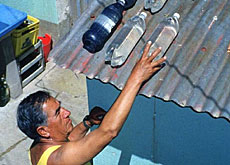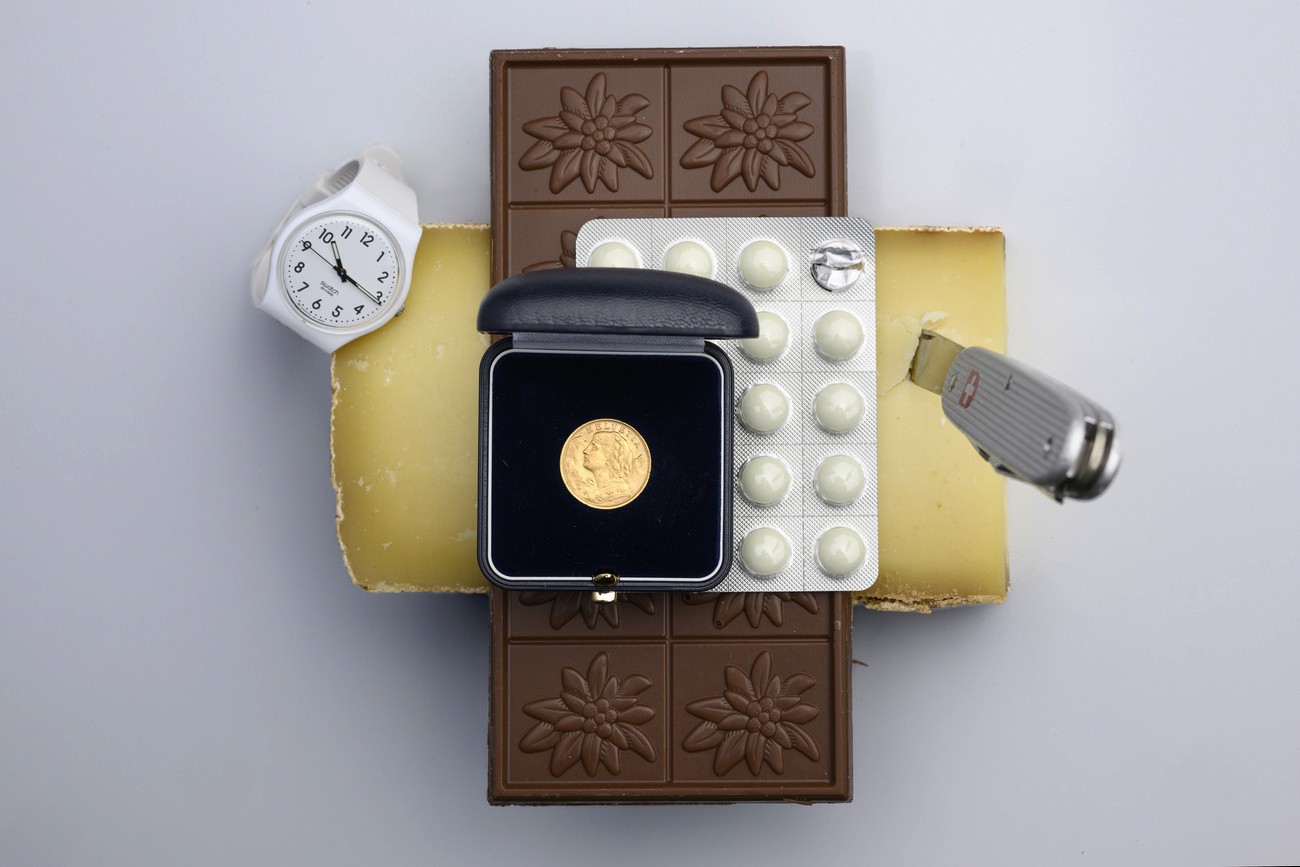
millions benefit from swiss clear thinking

Clean, cheap and accessible water is still nothing more than a pipedream for much of the world's population.
But two Swiss systems with low-tech approaches show that unsafe water need not be a problem.
Bulane, a Geneva-based company, has developed the Watalys, a system that produces a chlorine disinfectant. The Sodis foundation is promoting the use of plastic bottles to purify water.
The Watalys can hardly be called high-tech. Its development was prompted by the fact that the chlorine tablets traditionally used to clean water have a short shelf-life and are difficult to transport.
To overcome this, the device uses electrolysis, one of the basic methods for breaking down chemicals.
In this case, it involves plunging an electrode into a litre of water where a small amount of salt – which contains chlorine atoms – has been
added.
Electric current is then sent through the electrode, provoking a chemical reaction. An hour later, the solution is chlorinated and can be used to disinfect large amounts of water.
Two problems crop up when using the Watalys. One is finding a power source and the other is teaching people how to use it.
Power source
Electricity can be supplied two ways: either via a car battery or by using solar cells. “The non-governmental organisations (NGOs) that use our device in the field usually have a vehicle, so there is normally a power source at hand,” says Pierre Leitgib, one of
Bulane’s founders.
Educating people how to use the Watalys properly is more of a problem. According to Leitgib, only small quantities of the chlorine solution are required to disinfect water supplies.
“The dosage is fairly precise, so you have to make sure people understand what they are doing,” he told swissinfo.
There was another problem that the Watalys’s creators had never considered. “Some of our customers pointed out that you had to take the salt with you to use in the device in some areas,” admits Leitgib.
So far, the company has distributed
more than 200 units, mainly to NGOs and international agencies, who also deal with educational issues.
This is not really surprising since the Watalys costs at least SFr230 ($175) – money people in developing countries would often rather spend on something else.
Cheap solution
With cost an issue, another Swiss system may be a cheaper solution for water purification. Sodis, developed by scientists at the Federal Institute for Environmental Science and Technology, uses plastic bottles to disinfect water with sunlight.
Sodis has already been implemented
in 20 countries.
People can clean water in clear plastic bottles simply by filling them up, shaking them and then leaving them in the sun for at least six hours, if possible on a sheet of corrugated iron or a roof.
The increased temperature of the water caused by the sunlight is enough to kill many forms of bacteria and viruses.
The biggest drawbacks are its reliance on the sun, which is not always around when you need it, and the limited quantity of water that can be put into a bottle.
But possibly the greatest hurdle is convincing people that such a cheap solution is effective. Where it has
been implemented, it has generally been met with widespread acceptance.
“First of all you have to convince government officials,” said Regula Meienhofer of the institute. “Then you have to convince local users that Sodis does improve water quality – either by conducting quality tests in front of them or by getting community leaders to promote it.”
According to its promoters, the best motivation for people to adopt new technology is fear. While diarrhoea might not seem sufficient reason for many people to panic in the developing world, cholera will be enough to make them sit up and take notice.
swissinfo, Scott Capper
One of the United Nations Millennium Development Goals is to halve, by 2015, the number of people without sustainable access to safe drinking water and sanitation.
According to a recent UN report the world has plenty of water but mismanagement, limited resources and environmental changes mean that almost 20% of the planet’s population can still not get safe water and 40% lack basic sanitation.
Every year there are 1.6 million diarrhoeal deaths related to unsafe water, most of them children under the age of five.
Natural catastrophes also threaten water supplies. The Asian tsunami in December 2004 that killed more 180,000 people highlighted how fragile water supplies can be.
Water-borne diseases such as cholera, typhoid and dysentery threatened thousands of survivors in the aftermath.
Bulane, which developed and distributes the Watalys, is based in Geneva.
Its founders were awarded the De Vigier Entrepreneurship Prize in 2005.
The smallest Watalys unit weighs only 150 grams but can produce one litre of chlorine solution from one litre of water and a spoonful of salt in one hour.
The Sodis system, which was developed in the early 1990s, has been implemented in more than 20 countries and over two million people are regular users.

In compliance with the JTI standards
More: SWI swissinfo.ch certified by the Journalism Trust Initiative




























You can find an overview of ongoing debates with our journalists here . Please join us!
If you want to start a conversation about a topic raised in this article or want to report factual errors, email us at english@swissinfo.ch.